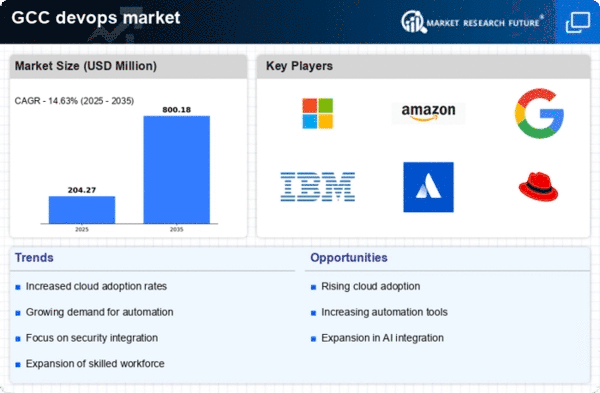Rising Demand for Agile Development
The devops market in the GCC is experiencing a notable surge in demand for agile development methodologies. Organizations are increasingly recognizing the need for rapid software delivery and iterative development processes. This shift is driven by the desire to enhance collaboration between development and operations teams, thereby improving overall efficiency. According to recent data, the adoption of agile practices in the region has increased by approximately 35% over the past year. This trend is likely to continue as businesses strive to remain competitive in a fast-paced digital landscape. The integration of agile methodologies into the devops market is expected to foster innovation and responsiveness, ultimately leading to improved customer satisfaction and business outcomes.
Investment in Digital Transformation
Digital transformation initiatives are significantly influencing the devops market within the GCC. Organizations are allocating substantial budgets towards modernizing their IT infrastructure and adopting advanced technologies. Recent reports indicate that investments in digital transformation are projected to reach $20 billion by 2026 in the region. This influx of capital is likely to drive the demand for devops solutions, as companies seek to streamline operations and enhance service delivery. The emphasis on digital transformation is fostering a culture of continuous improvement and innovation, which is essential for organizations aiming to thrive in an increasingly digital economy. Consequently, the devops market is poised for robust growth as businesses prioritize technological advancements.
Growing Focus on Data-Driven Decision Making
The devops market is witnessing a growing emphasis on data-driven decision making among organizations in the GCC. Companies are increasingly leveraging analytics and data insights to inform their operational strategies and improve performance. This trend is indicative of a broader shift towards a more analytical approach in business operations, where data is utilized to optimize processes and enhance service delivery. As organizations recognize the value of data in driving efficiency, the demand for devops solutions that facilitate data integration and analysis is likely to rise. This focus on data-driven methodologies is expected to enhance the agility and responsiveness of businesses within the devops market, ultimately leading to better outcomes.
Regulatory Compliance and Governance Requirements
Regulatory compliance and governance are becoming increasingly critical factors influencing the devops market in the GCC. Organizations are facing heightened scrutiny regarding data protection, privacy, and operational transparency. As a result, there is a growing need for devops solutions that facilitate compliance with local and international regulations. Recent data indicates that compliance-related investments in the region are expected to grow by 25% over the next few years. This trend is likely to drive the demand for devops practices that incorporate security and compliance measures into the software development lifecycle. Consequently, organizations are prioritizing governance frameworks that align with their operational strategies, thereby shaping the future landscape of the devops market.
Emergence of Artificial Intelligence and Machine Learning
The integration of artificial intelligence (AI) and machine learning (ML) technologies is emerging as a key driver in the devops market across the GCC. Organizations are increasingly adopting AI and ML to automate processes, enhance predictive analytics, and improve decision-making capabilities. This technological advancement is expected to streamline operations and reduce time-to-market for software products. Recent studies suggest that the use of AI in devops practices could lead to a 30% increase in operational efficiency. As businesses continue to explore the potential of AI and ML, the devops market is likely to evolve, offering innovative solutions that cater to the growing demand for intelligent automation.

















